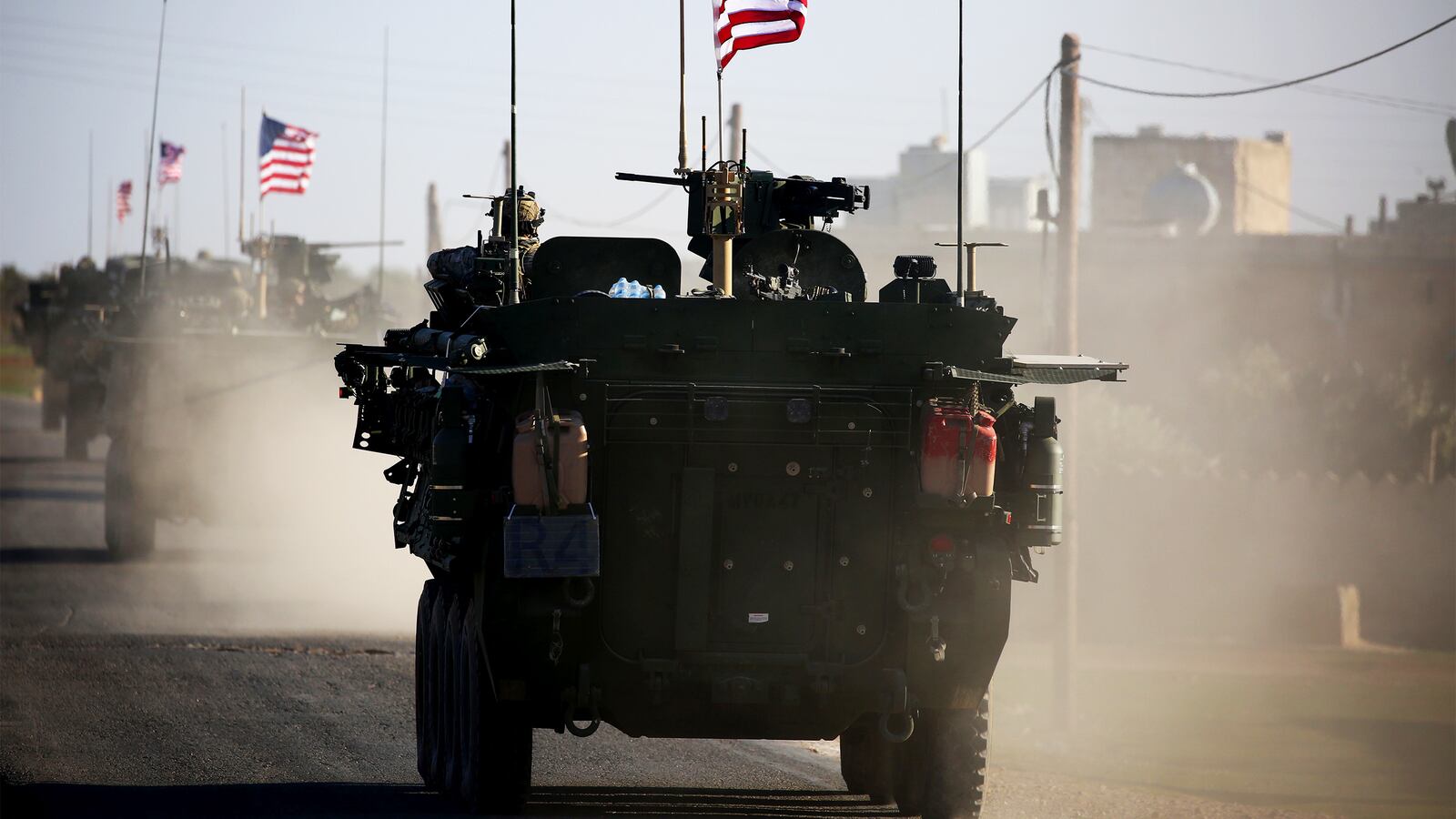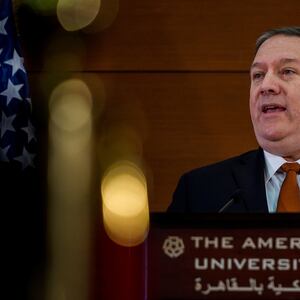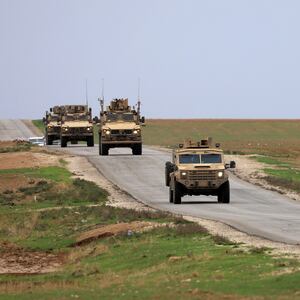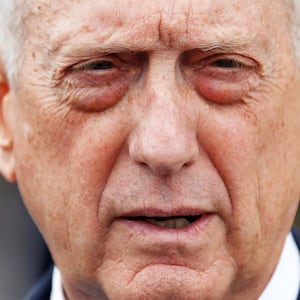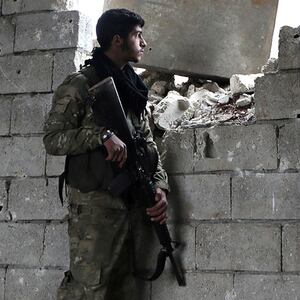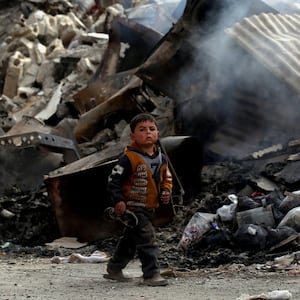Amid reports that the United States withdrawal of troops from Syria already has begun, a leading Syrian human rights group is accusing President Donald Trump of, at a minimum, “an attitude of negligence and indifference.”
Alleging possible war crimes among the offenses committed by the U.S.-led anti-Islamic State coalition, the report by the Syrian Network for Human Rights (PDF) called on the U.S. to “reassess its decision on the withdrawal of U.S. troops.” Basically it is arguing that much of what’s broken is the Americans’ responsibility to fix, no matter how savage the enemy they were up against.
The analysis of the political impact of U.S. plans is scathing, and comes just as U.S. Secretary of State Mike Pompeo has sought to clarify and ennoble Trump administration decisions in the region that have been seen as capricious and confusing.
“We learned that when America retreats, chaos often follows. When we neglect our friends, resentment builds. And when we partner with enemies, they advance,” Pompeo told an audience in Cairo on Thursday. “The good news is this: The age of self-inflicted American shame is over, and so are the policies that produced so much needless suffering.”
Nothing could be farther from the picture given by the SNHR report, which concludes “from a human rights perspective, U.S. forces cannot simply leave after four years of military intervention without contributing to the resolution of cases that are still pending, some of which occurred as a direct result of the military intervention.”
Trump, evidently frustrated by the intractable nature of the Middle East battlefield, announced the Syria pullout December 19 against the wishes of Defense Secretary James Mattis, who resigned a day later, and over the protests of many in Congress, including Sen. Lindsey Graham. Since then Graham and National Security Advisor John Bolton have tried to dilute or even reverse the impact of the decision, but it appears that argument is over.
On Thursday, Col. Sean Ryan, spokesman for the U.S.-led coalition fighting ISIS, confirmed the U.S. has started “the process of our deliberate withdrawal” from Syria, adding: “Out of concern for operational security, we will not discuss specific timelines, locations, or troop movements.”
“Over the past four years, the U.S.-led Coalition have committed numerous violations of international humanitarian law, many of which constitute war crimes, including attacks which caused civilian deaths, including women and children,” the SNHR report declared.
But the U.S. is in a self-congratulatory mood.
“President Trump empowered our commanders in the field to strike ISIS quicker and harder than ever before. And now 99 percent of the territory ISIS once held is liberated,” Pompeo said in Cairo. “Life is returning to normal for millions of Iraqis and Syrians. Nations in the global coalition should all be enormously proud of this achievement. Together we have saved thousands of lives.”
SNHR, for its part, is calling for compensation for the nearly 3,000 civilians it said were killed in the U.S.-led war against Islamic extremists. Citing its own database, it said 2,984 civilians had been killed in coalition actions, including 932 children and 646 women. The U.S.-led coalition acknowledges killing a total of 1,139 civilians in Iraq and Syria since 2014 but has not published detailed figures comparable to those of the rights group.
The civilian toll is an aspect of the American deployment largely missing from the national debate over Trump’s abrupt decision to pull the 2,000 or so Special Operations Forces. The main focus has been on the fate of the Kurdish YPG militia, the People’s Protection Units, which functioned as the U.S. military’s ground force capturing cities ISIS had occupied in Syria.
But the Qatar-based human rights group, echoing the position of the Turkish government, calls the YPG a “radical organization” affiliated with the Kurdistan Workers Party, a U.S.-designated terrorist group. The YPG was “effectively appointed to govern massive areas” after they’d cleared them of ISIS’s presence. Yet, one year later, the U.S. had made “little effort” to achieve democratically elected local governance and work to achieve political and social stability in the region.
Areas cleared by the YPG “have not even seen the removal of rubble or the rehabilitation of the most important vital facilities such as hospitals, schools and markets,” and most of the displaced population have not returned to their homes.
“President Trump has made the decision to bring our troops home from Syria,” Pompeo told his audience. “We always do and now is the time, but this isn’t a change of mission. We remain committed to the complete dismantling of ISIS – the ISIS threat – and the ongoing fight against radical Islamism in all of its forms.”
From the SNHR perspective withdrawal of the 2,000 Special Operations Forces “reflects an attitude of negligence and indifference to the Syrian issue and constitutes an additional appeasement of Russian expansionism.” The report noted that Russia last spring had abandoned a 2017 agreement with the U.S. to set up a deconfliction zone in southern Syria.
Its most biting criticism was over the U.S. failure to establish strong local and democratic governance in the former ISIS areas.
“The United States, which had multiple opportunities to contribute to the process of democratic change and to help the Syrian people to build a modern democratic state to take its place alongside civilized advanced democracies, has squandered these opportunities,” the group said.
The American failure to establish a strong political structure in the territory it’s deserting “will leave vast tracts of land not only at risk of an expansion by ISIS, but more dangerously, to the expansion by Iranian militias,” it said.
On Wednesday The Daily Beast asked U.S. Central Command and the State Department for comment on the main conclusions of the SNHR report but has received no response.
The report was written by Fadel Abdul Ghani, a 38-year-old civil engineering graduate from Homs who founded the Syrian network in 2011. Its work has been cited frequently in annual human rights reports published by the State Department.
Ghani said one quarter of Syria — Hasakah, Deir Ezzor and Raqqa provinces — are now under YPG control, backed by the United States, and the biggest single question was their fate.
“What is their future? Who will rule them?” he asked. “This is an American responsibility.”
Withdrawing without determining the future rule could lead to “a long civil war between Arabs and Kurds.” The people “will not accept rule by extremists who don’t represent the Kurds,” he said. He predicted that the YPG will hand over the region to the Assad government.
The other issue, he said, is accountability and compensation for the civilians killed by U.S. airstrikes or by the Syrian Democratic Forces, the YPG-dominated Kurdish-Arab ground force, during the four and a half years since the U.S. intervened in Syria.
Ghani said he could back up his assertion that the U.S. had committed war crimes with a carefully compiled database. He said here are “hundreds” of examples of disproportionate responses to military attacks and a failure to distinguish between civilian and military objects. “Each time you shell without distinguishing between fighters and civilians and it leads to loss of lives, it’s a violation,” he said.
Other organizations have also raised concerns about possible U.S. war crimes in Syria.
The U.N. Commission of Inquiry into Syria report gave an example in March 2017 where a Coalition aircraft targeted ISIS fighters in a village in Aleppo, killing up to 25 people, of whom 13 were civilians, nine of them children. Local sources said ISIS fighters had forced the civilians into the house as hostages, according to the commission. But the U.S.-led Coalition claimed that one civilian was “inadvertently killed as a result of the blast following the strike.”
The airstrike “raises concerns regarding the proportionality and precautions in attacks under international humanitarian law,” the U.N. commission said.
In March 2017, The Daily Beast reported that at least 29 civilians at a prayer meeting in Al Jinah, Idlib, northern Syria had been killed in a U.S. airstrikes. The U.S. Central Command claimed to have killed “several terrorists” from Al Qaeda.
After a weeks-long investigation, Human Rights Watch concluded the U.S. warplane had hit a mosque. “U.S. Authorities’ failure to take adequate precautions,” was the report’s subtitle. The “failure to understand the most fundamental aspects of the target and pattern of life around the target raises the question whether officers were criminally reckless in authorizing the attack,” HRW wrote in its report.
But the Pentagon after an internal inquiry concluded that the U.S. warplane had killed two dozen Al Qaeda fighters and possibly one civilian.
Human rights groups have had a running dispute with the U.S. military about the number of civilians killed in U.S.-led anti-ISIS campaigns. SNHR estimates the civilian death toll from U.S.-led Coalition bombing at 2,934. But Airwars, a British-based monitoring group, estimates the death toll in Syria at a minimum of 4,919 for that period — a significantly higher figure. The U.S. Central Command has not yet provided a figure.
In Raqqa alone, SNHR says 1,785 civilians were killed either by Coalition bombing or by YPG-led ground force operations. That’s well over half the overall total for civilians killed in four years. Airwars estimated the total at 2,100. The Pentagon has not provided its figure.
How to explain the discrepancies? “It points to systematic flaws in a military system highly depending upon what’s observable from above – even while most civilians continue to die in unobservable spaces below,” Alex Hopkins of Airwars told The Daily Beast by email. “The U.S. and its allies need to pay far more attention to the voices of communities directly affected by their military actions.”
Russia, unlike the U.S., does not acknowledge civilian casualties, but the number of civilian casualties attributed to Russia is twice that of the U.S.: 6,231 from the time Russia entered the war in September 2015 through September 2018, according to SNHR. Airwars estimates the number at a minimum of 12,713 (and possibly as high as 19,327).
SNHR’s database has names, locations, photos and other details of civilians killed, Ghani told The Beast. He said U.S. Central Command has never contacted his group and never agreed to a meeting. He criticized CENTCOM for “a strategy of admitting some incidents, denying others,” not doing an adequate investigation and not following through by holding its officers responsible for their mistakes. He said he was unaware of any compensation for the victims for those incidents that have been admitted.
The Pentagon did not immediately respond when asked if any compensation had been paid out.

